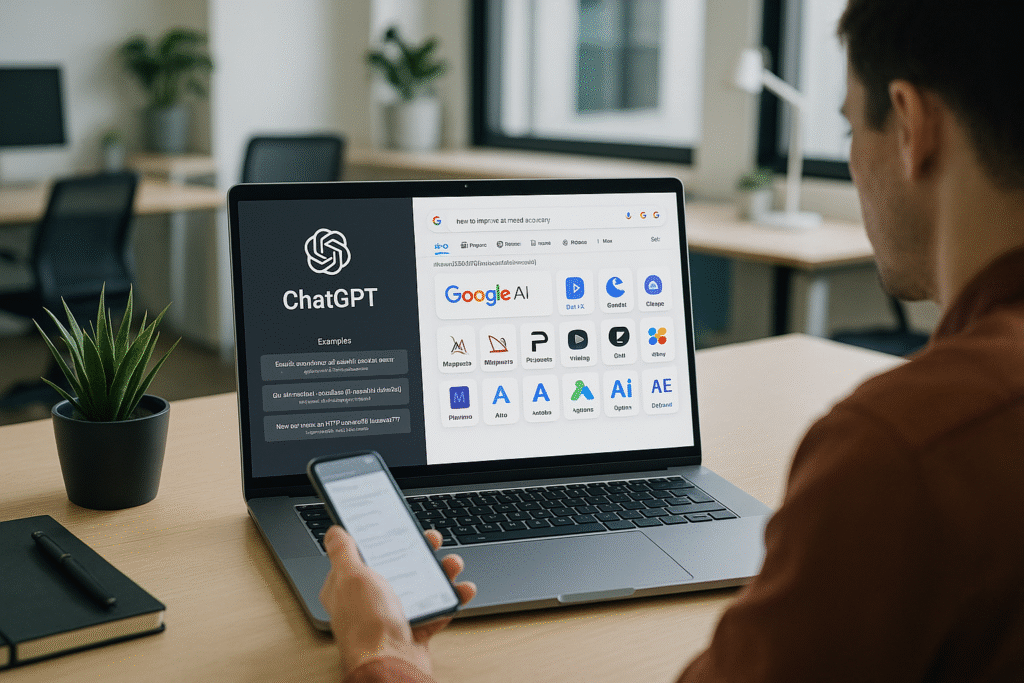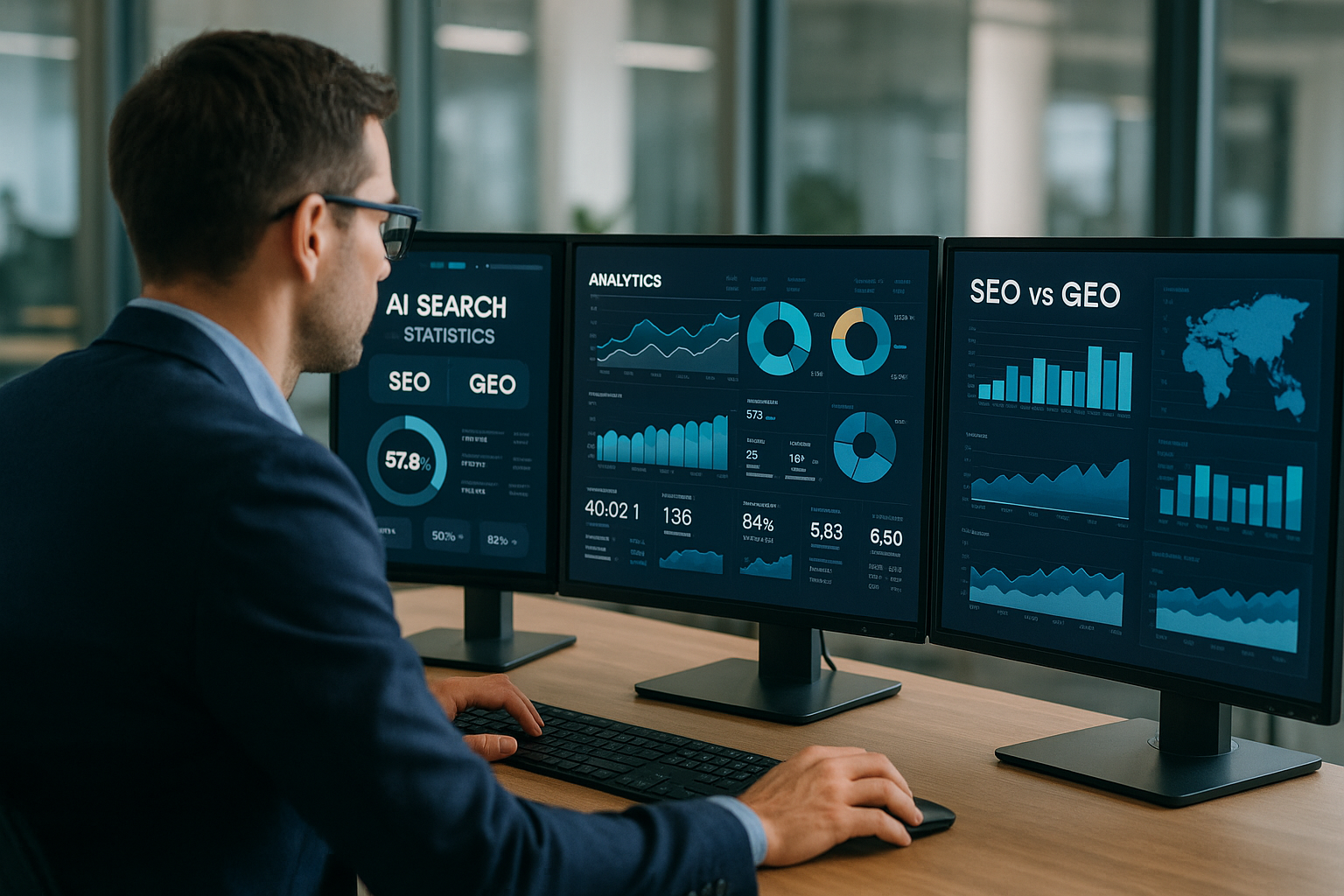How SEO to GEO Optimize for Generative AI to Stay Visible in 2025
SEO to GEO Optimization The digital marketing landscape is experiencing its most dramatic transformation since the advent of Google. With 400 million weekly users now engaging with ChatGPT and 13% of all Google searches displaying AI Overviews, the era of Generative Engine Optimization (GEO) has arrived. This isn’t just another SEO trend it’s a fundamental shift that’s already reshaping how users discover information and how businesses must adapt to remain visible.
Table of Contents
The Search Revolution: Understanding the Shift from SEO to GEO Optimize
The Numbers Don’t Lie: AI Search is Here
The statistics paint a clear picture of this transformation. Currently, 58.5% of searches in the US result in zero clicks, meaning users get their answers directly from search results without visiting websites. This represents a seismic shift from the traditional click through model that has dominated search for decades.
Even more striking is the growth trajectory: generative AI traffic is growing 165 times faster than organic search. While Google still processes an impressive 14 billion searches daily compared to ChatGPT’s 37.5 million daily prompts, the acceleration of AI adoption suggests this gap will narrow significantly.
Generation Z is leading this charge, with 31% of their searches now conducted on AI platforms like ChatGPT. By 2027, projections indicate 90 million Americans will be using AI as their primary search tool, up from just 13 million in 2023.
What This Means for Website Traffic
The impact on organic traffic is already measurable. Studies show that AI searches have reduced organic web traffic by 15-25%, with some websites experiencing drops between 18-64% after Google’s AI Overviews launched. When AI Overviews appear in search results, organic click-through rates plummet from 1.4% to just 0.6%.
Understanding GEO: The New Optimization Paradigm

Defining Generative Engine Optimization
Generative Engine Optimization (GEO) is the strategic process of formatting and structuring content specifically for AI search platforms like ChatGPT, Claude, Perplexity, and Google’s AI features. Unlike traditional SEO, which focuses on ranking in search engine results pages, GEO aims to get your content directly cited when AI engines answer user queries.
SEO vs GEO: Key Differences
The fundamental differences between SEO and GEO OPTIMIZATIONrepresent a paradigm shift in digital marketing strategy:
| Aspect | SEO | GEO |
|---|---|---|
| Primary Goal | Rank higher in SERPs | Get cited in AI responses |
| Success Metric | Rankings, traffic, conversions | Citation frequency in AI answers |
| Content Focus | Engaging content for clicks | Factual, structured content |
| User Journey | Click through to websites | Information served directly |
| Ranking Signals | Keywords, backlinks, authority | Entity recognition, accuracy |
| Technical Requirements | Crawlability, Core Web Vitals | Schema markup, JSON-LD |
| Speed Priority | Page load speed for UX | Fast API responses |
The GEO Strategy Framework: 8 Essential Tactics
1. Master the Fundamentals of Technical Optimization
Make Your Content AI-Accessible
AI systems have strict requirements for content accessibility. Ensure your site is:
- Crawlable and indexable by AI tools
- Fast-loading with server-side rendering where possible
- Secure (HTTPS) to build trust with AI systems
- Mobile-friendly for comprehensive access
2. Implement Comprehensive Schema Markup
Structured Data as Your AI Translator
Schema markup has evolved from an SEO nice-to-have to a GEO necessity. 72% of websites appearing in Google results use structured data, and this becomes even more critical for AI search visibility.
Focus on implementing:
- FAQ schema for question-and-answer content
- How-to schema for instructional content
- Product schema for e-commerce
- Article schema with proper entity linking
- Organization schema for brand recognition
The key is creating one connected graph rather than separate blocks of code, helping AI systems understand relationships between entities.
3. Build Authority Through E-E-A-T Principles
Experience, Expertise, Authoritativeness, and Trustworthiness
AI systems prioritize content that demonstrates strong E-E-A-T signals. This means:
- Experience: Share real results, personal use, and firsthand knowledge
- Expertise: Stick to topics you truly know and go deep
- Authoritativeness: Get quoted, contribute to well-known sites, earn quality backlinks
- Trustworthiness: Use real author bios, cite sources, include reviews and testimonials
4. Structure Content for AI Comprehension
One Idea Per Paragraph Rule
AI systems process information differently than humans, breaking content into chunks and analyzing relationships. Optimize by:
- Keeping paragraphs short and focused on single concepts
- Using clear headings and subheadings as navigation signposts
- Front-loading key points in the first sentence of each section
- Creating logical content flow that AI can easily parse
5. Leverage Reddit and Community Platforms
The Second Most Cited Source by ChatGPT
Reddit has become the second most common site cited by ChatGPT, with its presence in Google search results increasing by 191% in 2024. Develop a strategic Reddit presence by:
- Contributing valuable insights to relevant subreddits
- Building authentic community engagement over time
- Sharing expertise without overt self-promotion
- Participating in industry discussions to build authority
6. Optimize for Query Intent Classification
Modern AI platforms use sophisticated systems to understand user intent, with query intent classification holding 15% influence in LLM decision-making, followed by semantic similarity scores at 13%. Create content that:
- Directly answers specific questions
- Provides comprehensive coverage of topics
- Uses natural, conversational language
- Addresses multiple related intents within single pieces
7. Focus on Freshness and Regular Updates
AI Prefers Fresh, Accurate Content
AI search platforms prefer content that is 25.7% fresher than traditional organic results. Implement a content freshness strategy:
- Monthly updates for evergreen guides and FAQs
- Quarterly reviews for high performing blog posts
- Annual overhauls for cornerstone content
- Real-time updates for industry news and trends
8. Monitor and Measure GEO Performance
Track AI Visibility Across Platforms
Traditional SEO metrics don’t capture GEO success. Monitor:
- Citation frequency in AI responses
- Brand mention rates across AI platforms
- Share of voice compared to competitors
- Sentiment analysis of AI-generated mentions
- Traffic from AI referral sources
Implementation Roadmap: Getting Started with GEO

Phase 1: Foundation (Weeks 1-4)
- Audit current content for AI accessibility
- Implement basic schema markup
- Optimize site speed and technical performance
- Review and strengthen E-E-A-T signals
Phase 2: Content Optimization (Weeks 5-8)
- Restructure existing content for AI comprehension
- Create FAQ and How to sections
- Develop community engagement strategy
- Begin regular content freshness program
Phase 3: Advanced Tactics (Weeks 9-12)
- Implement advanced schema relationships
- Launch targeted Reddit strategy
- Create AI-optimized content calendar
- Set up comprehensive tracking systems
Phase 4: Scale and Optimize (Ongoing)
- Monitor performance across AI platforms
- Refine strategies based on data
- Expand to additional AI search engines
- Continuously update and improve content
Industry-Specific GEO Considerations
For Home Improvement Contractors
- Implement LocalBusiness schema with service areas
- Create location specific FAQ pages
- Optimize for “near me” and local intent queries
- Showcase customer reviews and case studies
- Use Service schema for specific offerings
For E-commerce Businesses
- Prioritize Product schema with detailed specifications
- Create comprehensive buying guides
- Implement Review schema for social proof
- Optimize for comparison queries
- Include shipping and return information
For B2B Services
- Focus on Professional Service schema
- Create industry specific content hubs
- Showcase client case studies and testimonials
- Optimize for solution oriented queries
- Implement FAQ schema for common business questions
The Future of Search: Preparing for What’s Next
The transition from SEO to GEO Optimize represents more than a tactical shift it’s a fundamental change in how information discovery works online. Early adopters are already seeing 35%+ increases in AI-driven visibility, while companies that delay adaptation risk being left behind in an increasingly AI-dominated search landscape.
Key Trends to Watch
- Multimodal AI Search: Future AI systems will process text, images, video, and audio simultaneously
- Voice Search Integration: Conversational AI will merge with voice search capabilities
- Real-time Data Processing: AI systems will incorporate live data for more current responses
- Personalized AI Responses: AI answers will become increasingly tailored to individual users
The Bottom Line
GEO isn’t replacing SEO it’s expanding it. The most successful digital marketing strategies in 2025 and beyond will integrate both approaches, ensuring visibility across traditional search engines and AI-powered platforms. Companies that invest in GEO now will establish competitive advantages that compound over time.
The search landscape has fundamentally changed. The question isn’t whether to adapt to GEO, but how quickly you can implement these strategies to maintain and grow your digital visibility. As AI continues to reshape how users discover information, the brands that thrive will be those that speak the language of both humans and machines.
Ready to optimize for the AI-driven future? Start with the fundamentals: implement schema markup, strengthen your E-E-A-T signals, and begin structuring your content for AI comprehension. The transition from SEO to GEO isn’t just about staying visible it’s about staying relevant in an increasingly AI-powered world. Interested in transitioning to GEO but don’t know how to? Schedule a call with SocialCode’s GEO specialist today!



